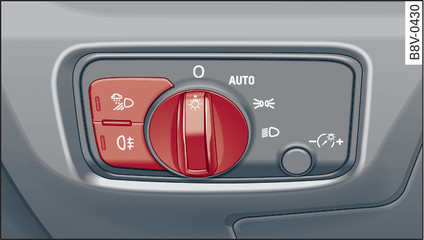|
|
Turn the switch to the appropriate position. The
 symbol lights up when the lights are on.
symbol lights up when the lights are on.
 symbol lights up when the lights are on.
symbol lights up when the lights are on.
O - Lights off (on vehicles for some markets the daytime running lights* are switched on when the ignition is switched on).
AUTO* - The automatic headlights switch on (and off again) automatically according to the ambient light conditions (for instance at dusk, in the rain or in a tunnel).
 - Side lights
- Side lights - Dipped headlights
- Dipped headlights - All-weather lights*
- All-weather lights* - Rear fog light(s)
- Rear fog light(s)
All-weather lights*
On vehicles with all-weather lights, the front lights are adjusted automatically so that the headlights on your own vehicle do not blind you, for instance when driving on a wet road.
Your vehicle is equipped with a headlight range control to prevent oncoming traffic from being dazzled when the vehicle is heavily laden. The headlight beam settings are adjusted automatically (even during braking and acceleration).
Light functions
The following light functions depend on which equipment is fitted in your vehicle and work only when the light switch is set to AUTO.
Static cornering light (turning light)* (on vehicles with LED headlights) - the turning light is automatically activated when the steering wheel angle exceeds a specified value (up to about 70 km/h) or when the turn signals are switched on (up to about 40 km/h). This feature provides better illumination at the side of the vehicle when you turn off at a junction.
Motorway light* (on vehicles with LED headlights) - this function adjusts the vehicle lighting on motorways, according to your speed.
Speed-dependent light distribution* (on vehicles with LED headlights) - this function adjusts the light distribution as required in towns, on motorways and on other main roads. Intersections can also be illuminated if your vehicle is equipped with a navigation system*.
If you drive a right-hand drive vehicle in a left-hand drive country, or vice versa, it is not necessary to adjust the headlights, as they are designed for use when driving on the left or right.
- The automatic headlights* are only intended to assist the driver. The driver must always ensure that the headlights are used when required, and may have to switch them on manually when the light conditions or visibility are poor. For example, the light sensors are not able to detect fog. Therefore, you should always switch on the dipped headlights
 in these conditions and when driving after dark.
in these conditions and when driving after dark.
- To avoid dazzling the traffic behind you, the rear fog light should only be used in accordance with statutory regulations.
- If the battery has been losing charge for a while, the side lights or parking lights may be switched off automatically. Always park your car in a safe and suitably lit place according to the applicable regulations. Avoid using the side lights for long periods (several hours). If possible, switch the left or right parking lights on.
- Observe all relevant statutory requirements when using the lighting systems described here.
Note
- The light sensor for the automatic headlights* is located in the mounting for the interior mirror. Do not affix any stickers on this section of the windscreen.
- Some of the settings for the exterior lighting can be adjusted link►.
- A buzzer will sound if you switch off the ignition and open the door when the exterior lighting is on.
- On vehicles for some markets, the rear lights switch on together with the daytime running lights.
- In cool or damp weather, the inside of the headlights, turn signals or rear lights can sometimes mist up, due to the temperature difference between the interior and exterior of the car. They should clear again partially or completely soon after you switch on the headlights. This phenomenon has no influence on the life expectancy of the vehicle lights.


